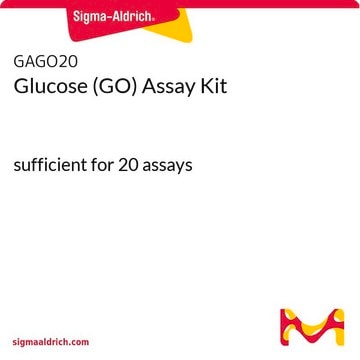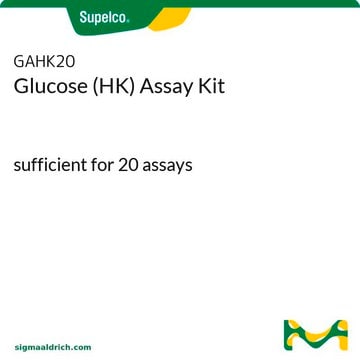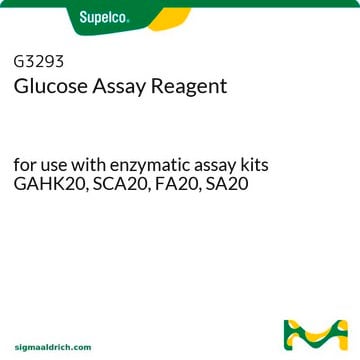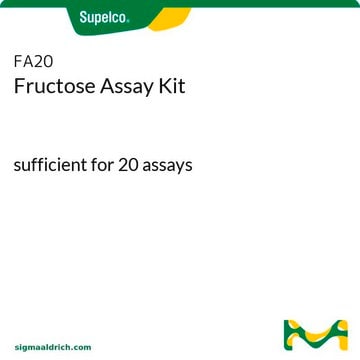MAK263
Glucose Colorimetric/Fluorometric Assay Kit
sufficient for 100 colorimetric or fluorometric tests
Sign Into View Organizational & Contract Pricing
All Photos(1)
About This Item
UNSPSC Code:
12161503
NACRES:
NA.84
Recommended Products
usage
sufficient for 100 colorimetric or fluorometric tests
application(s)
cosmetics
food and beverages
detection method
colorimetric
fluorometric
relevant disease(s)
endocrinological disorders, diabetes
storage temp.
−20°C
General description
Glucose is a primary energy source that naturally occurs in its free state in fruits and other plant parts. Abnormal glucose levels have been associated with several metabolic dysfunctions such as hypoglycemia, hyperglycemia, and diabetes mellitus. Measurements of glucose levels in tissues and body fluids (such as blood and urine) are often used for the diagnosis of glucose– related disorders. Glucose levels are also monitored to check the efficacy of therapeutics such as insulin and sulphonylureas in type 2 diabetics.
Features and Benefits
Compatible with high-throughput handling systems.
Suitability
Suitable for the determination of glucose concentrations in various biological samples, including serum, plasma, food, or growth medium. This kit is also suitable for monitoring glucose levels during fermentation and glucose feeding in protein expression processes.
Principle
Glucose is oxidized to generate a colorimetric (570 nm)/ fluorometric (λex = 535/λem = 587 nm) product, proportional to the amount of glucose present. The kit is able to detect 1-10,000 μM of glucose in various samples.
related product
replaced by
Product No.
Description
Pricing
Signal Word
Danger
Hazard Statements
Precautionary Statements
Hazard Classifications
Aquatic Chronic 3 - Resp. Sens. 1
Storage Class Code
10 - Combustible liquids
Flash Point(F)
Not applicable
Flash Point(C)
Not applicable
Certificates of Analysis (COA)
Search for Certificates of Analysis (COA) by entering the products Lot/Batch Number. Lot and Batch Numbers can be found on a product’s label following the words ‘Lot’ or ‘Batch’.
Already Own This Product?
Find documentation for the products that you have recently purchased in the Document Library.
Ryan K Perkins et al.
Nutrients, 11(3) (2019-03-03)
The purpose of this investigation was to evaluate the effects of experimental hyperglycemia on oxidative damage (OX), advanced glycation end products (AGEs), and the receptor for AGEs (RAGE) through an in vivo approach. Obese subjects (n = 10; 31.2 ±
Ye Du et al.
Frontiers in oncology, 10, 580176-580176 (2021-01-05)
Hypoxia is an important environmental factor and has been correlated with tumor progression, treatment resistance and poor prognosis in many solid tumors, including triple-negative breast cancer (TNBC). Emerging evidence suggests that long noncoding RNA (lncRNA) functions as a critical regulator
Trinidad León-Quinto et al.
Insects, 13(2) (2022-02-26)
The red palm weevil (RPW), Rhynchophorus ferrugineus, is one of the worst palm pests worldwide. In this work, we studied the physiological basis underlying its adaptive strategy against low temperatures. Specifically, we analyzed the main low-molecular-weight biochemical substances acting as
Jake N Barber et al.
The ISME journal, 16(5), 1442-1452 (2022-01-24)
Species loss within a microbial community can increase resource availability and spur adaptive evolution. Environmental shifts that cause species loss or fluctuations in community composition are expected to become more common, so it is important to understand the evolutionary forces
Gemma K Kinsella et al.
International journal of molecular sciences, 22(19) (2021-10-14)
GPR21 is a constitutively active, orphan, G-protein-coupled receptor, with in vivo studies suggesting its involvement in the modulation of insulin sensitivity. However, its precise contribution is not fully understood. As the liver is both a major target of insulin signalling
Our team of scientists has experience in all areas of research including Life Science, Material Science, Chemical Synthesis, Chromatography, Analytical and many others.
Contact Technical Service






